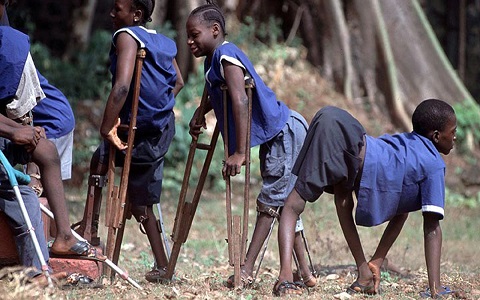

Recently, the World Health Organisation, W.H.O, declared Nigeria free of wild polio, following the completion of documentation for the free status.
With the development, W.H.O Director-General, Dr Tedros Ghebreyesus noted that the outstanding commitment and efforts that got Nigeria off the endemic list must continue, to keep Africa polio-free.
According to the organization, the incidence of polio since 1988 has been reduced by more than ninety-nine percent, at the time, more than three hundred and fifty thousand children were paralysed every year, in more than one hundred and twenty-five endemic countries.
As at today Pakistan and Afghanistan are the only two countries remaining with endemic transmission of polio.
In 2015, forty-one cases were reported, in both countries with thirty-two in Pakistan and nine in Afghanistan.
In the midst of the celebration, however, there are still some hurdles to cross if Nigeria and by extension Africa is to maintain the status of being a polio free continent.
Nigeria was the last country among the forty- seven countries in the African region to be certified polio free as a result of the record of the disease in Borno state in 2016.
About five hundred thousand children were denied access to health care as a result of insecurity in the north east in 2016.
The two countries, Pakistan and Afghanistan left with the disease have witnessed terrorist activities which had disrupted routine immunization and lead to death of health officials.
It therefore behoves government to ensure that peace is restored to the northern part of the country as this is a prerequisite for the health sector to thrive.
In addition, the existence of polio in any country remains a threat to the rest of the world.
For instance, an outbreak between 2003 and 2006 in northern part of the country led to national and international spread of the disease, re-infecting and causing one thousand four hundred and seventy –five cases in twenty former polio-free countries including Indonesia and Yemen.
The eradication of the disease in Africa should not be occasion for respite as polio remains a threat, thus vigilance and surveillance should be the watchword.
Moreover, the covid-19 pandemic has upturned people’s way of life leading to an interruption in routine immunisation in several African countries and also threatens to interrupt processes to deliver the polio vaccine and so many other lifesaving interventions in Africa.
With this government should not be tempted to reduce budget for immunization but integrate COVID-19 surveillance with immunization to avoid poor funding of other health segments in the sector .
The country’s victory over polio should strengthen the citizens and the government to improve the health sector and be seen as an avenue to tackle other diseases.
Fawzeeyah Kasheem